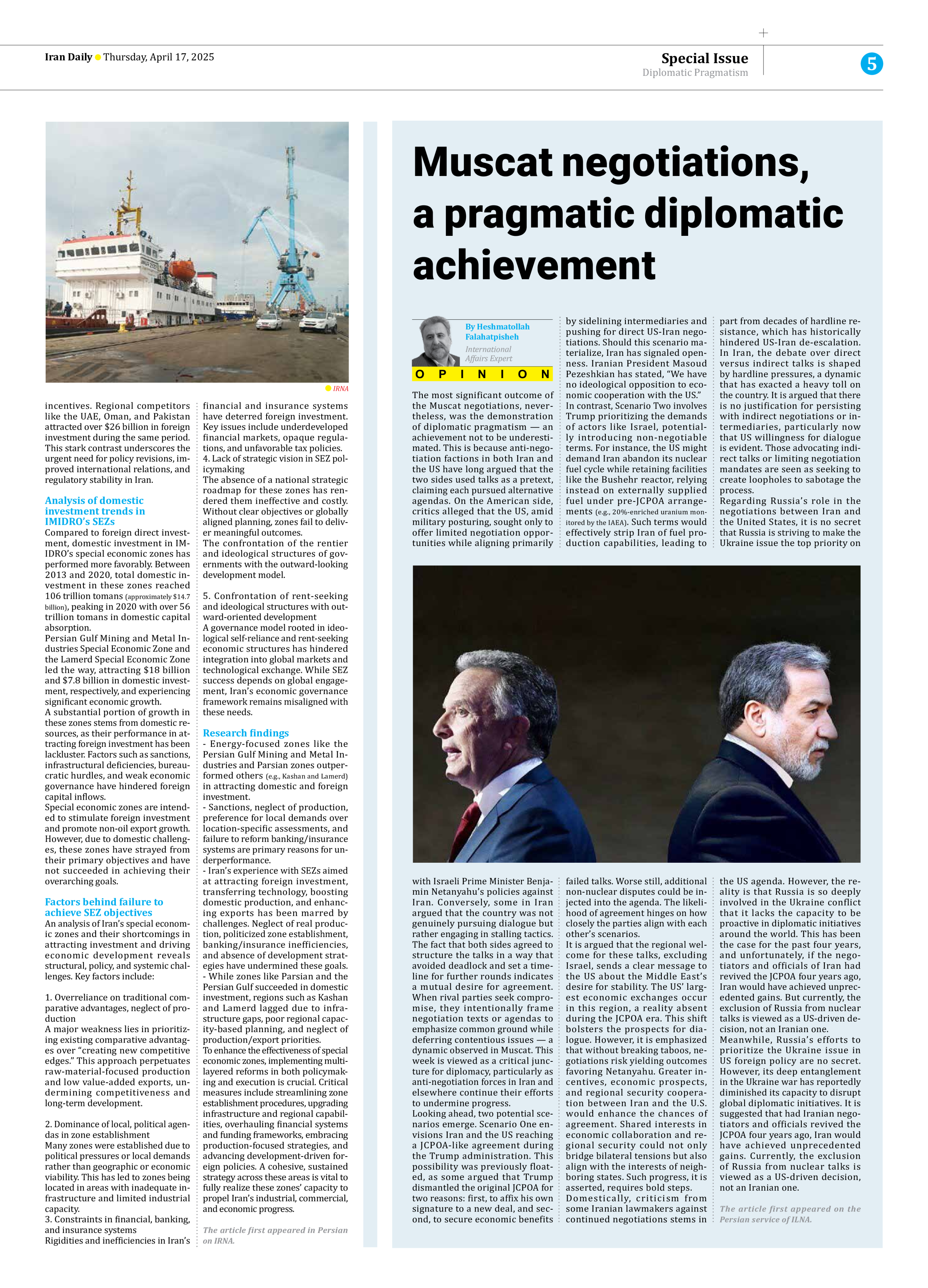
Muscat negotiations, a pragmatic diplomatic achievement
By Heshmatollah
Falahatpisheh
International
Affairs Expert
The most significant outcome of the Muscat negotiations, nevertheless, was the demonstration of diplomatic pragmatism — an achievement not to be underestimated. This is because anti-negotiation factions in both Iran and the US have long argued that the two sides used talks as a pretext, claiming each pursued alternative agendas. On the American side, critics alleged that the US, amid military posturing, sought only to offer limited negotiation opportunities while aligning primarily with Israeli Prime Minister Benjamin Netanyahu’s policies against Iran. Conversely, some in Iran argued that the country was not genuinely pursuing dialogue but rather engaging in stalling tactics.
The fact that both sides agreed to structure the talks in a way that avoided deadlock and set a timeline for further rounds indicates a mutual desire for agreement. When rival parties seek compromise, they intentionally frame negotiation texts or agendas to emphasize common ground while deferring contentious issues — a dynamic observed in Muscat. This week is viewed as a critical juncture for diplomacy, particularly as anti-negotiation forces in Iran and elsewhere continue their efforts to undermine progress.
Looking ahead, two potential scenarios emerge. Scenario One envisions Iran and the US reaching a JCPOA-like agreement during the Trump administration. This possibility was previously floated, as some argued that Trump dismantled the original JCPOA for two reasons: first, to affix his own signature to a new deal, and second, to secure economic benefits by sidelining intermediaries and pushing for direct US-Iran negotiations. Should this scenario materialize, Iran has signaled openness. Iranian President Masoud Pezeshkian has stated, “We have no ideological opposition to economic cooperation with the US.”
In contrast, Scenario Two involves Trump prioritizing the demands of actors like Israel, potentially introducing non-negotiable terms. For instance, the US might demand Iran abandon its nuclear fuel cycle while retaining facilities like the Bushehr reactor, relying instead on externally supplied fuel under pre-JCPOA arrangements (e.g., 20%-enriched uranium monitored by the IAEA). Such terms would effectively strip Iran of fuel production capabilities, leading to failed talks. Worse still, additional non-nuclear disputes could be injected into the agenda. The likelihood of agreement hinges on how closely the parties align with each other’s scenarios.
It is argued that the regional welcome for these talks, excluding Israel, sends a clear message to the US about the Middle East’s desire for stability. The US’ largest economic exchanges occur in this region, a reality absent during the JCPOA era. This shift bolsters the prospects for dialogue. However, it is emphasized that without breaking taboos, negotiations risk yielding outcomes favoring Netanyahu. Greater incentives, economic prospects, and regional security cooperation between Iran and the U.S. would enhance the chances of agreement. Shared interests in economic collaboration and regional security could not only bridge bilateral tensions but also align with the interests of neighboring states. Such progress, it is asserted, requires bold steps.
Domestically, criticism from some Iranian lawmakers against continued negotiations stems in part from decades of hardline resistance, which has historically hindered US-Iran de-escalation. In Iran, the debate over direct versus indirect talks is shaped by hardline pressures, a dynamic that has exacted a heavy toll on the country. It is argued that there is no justification for persisting with indirect negotiations or intermediaries, particularly now that US willingness for dialogue is evident. Those advocating indirect talks or limiting negotiation mandates are seen as seeking to create loopholes to sabotage the process.
Regarding Russia’s role in the negotiations between Iran and the United States, it is no secret that Russia is striving to make the Ukraine issue the top priority on the US agenda. However, the reality is that Russia is so deeply involved in the Ukraine conflict that it lacks the capacity to be proactive in diplomatic initiatives around the world. This has been the case for the past four years, and unfortunately, if the negotiators and officials of Iran had revived the JCPOA four years ago, Iran would have achieved unprecedented gains. But currently, the exclusion of Russia from nuclear talks is viewed as a US-driven decision, not an Iranian one.
Meanwhile, Russia’s efforts to prioritize the Ukraine issue in US foreign policy are no secret. However, its deep entanglement in the Ukraine war has reportedly diminished its capacity to disrupt global diplomatic initiatives. It is suggested that had Iranian negotiators and officials revived the JCPOA four years ago, Iran would have achieved unprecedented gains. Currently, the exclusion of Russia from nuclear talks is viewed as a US-driven decision, not an Iranian one.
The article first appeared on the Persian service of ILNA.







